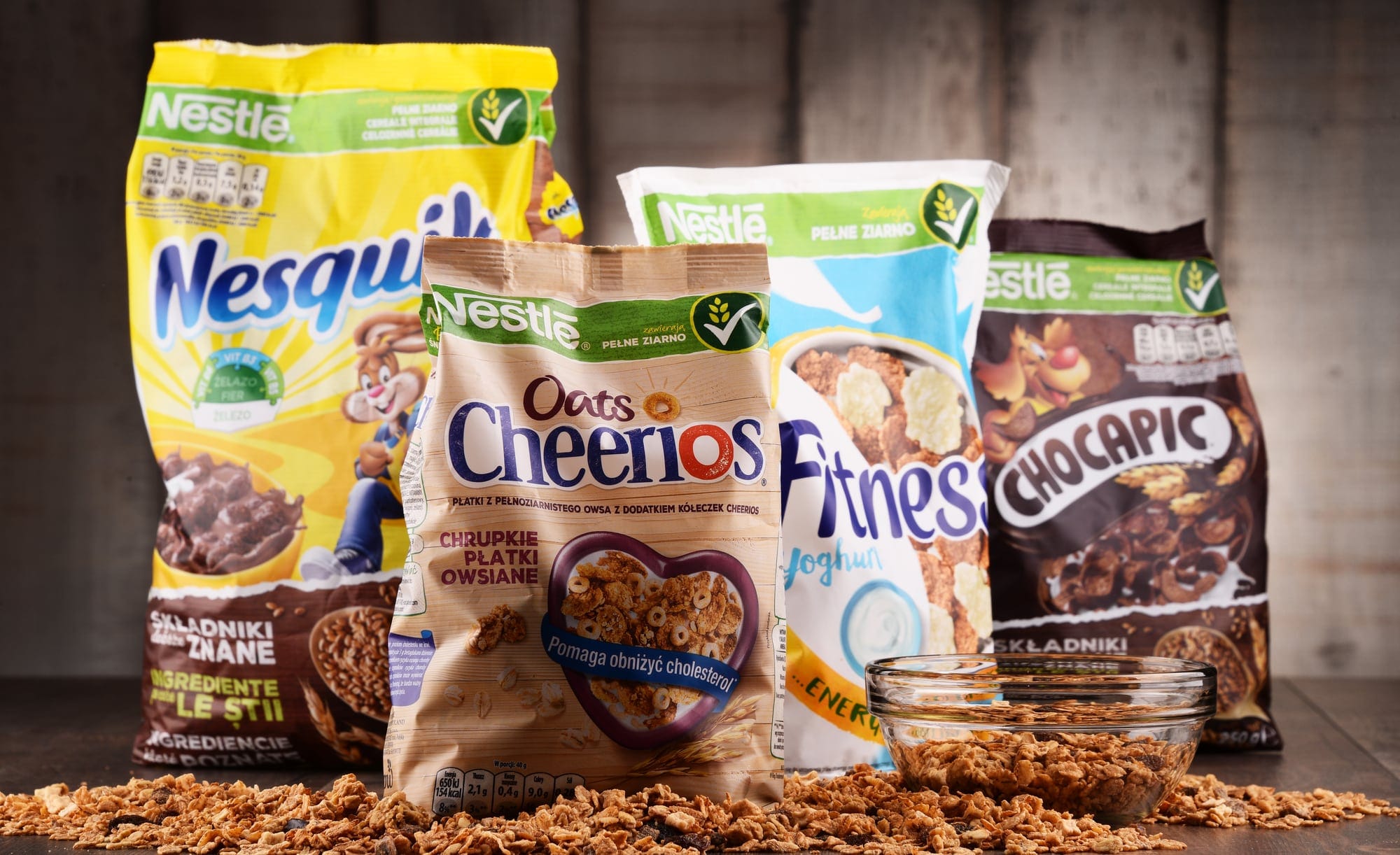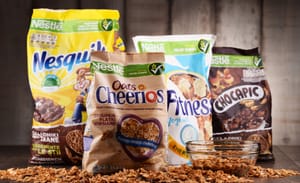We do a SWOT analysis of Nestle, to get a better perspective of the strengths, weaknesses, opportunities and threats to this popular food brand.
Nestlé, a global powerhouse in the food and beverage industry, is a name synonymous with nutrition, health, and well-being. Founded in 1866 by Swiss chemist Henri Nestlé, this company has a rich history rooted in addressing infant malnutrition. Nestlé's mission, therefore, extends beyond mere corporate pursuits—it's a commitment to improving lives through nourishment.
Stay with us to uncover the intricacies of this global giant and its role in shaping the future of food and beverage in our Nestle SWOTT analysis.
Nestlé's journey has been one of continuous evolution. Today, it boasts a diverse portfolio, including iconic brands like Nestlé, Nescafé, and KitKat, renowned for their high-quality, nutritious, and delicious products. These offerings cater to consumers of all ages, reflecting Nestlé's unwavering dedication to wellness and its signature slogan, "Good Food, Good Life."

Currently Nestle operates in 12 different segments of the consumer products market, including baby foods, bottled water, cereals, candy, coffee, prepared and prepackaged foods, dairy, drinks, food service, healthcare and nutrition, ice cream and pet care. Its staple of brands includes some of the best-known names in the industry, such as Stouffer’s, Dreyer’s, Haggen-Daz, Purina, Aero, Butterfinger, Gerber, Maggi and Perrier.
What sets Nestlé apart is its global reach. Operating in 188 countries, it employs a vast workforce of around 275,000 individuals. This extensive global presence enables Nestlé to connect with diverse markets and cultures, ensuring its products reach and enrich the lives of countless individuals and families worldwide.
In a rapidly changing world, Nestlé remains adaptable and innovative, striving to make "Good Food, Good Life" accessible to all. Its enduring commitment to nutrition, health, and well-being drives its success and relevance. Nestlé's extensive, diverse workforce positions it as a major player in the global food and beverage market, making a positive impact on millions and contributing to a healthier, happier future. Explore Nestlé's journey and the impact it makes in the realm of global nutrition and wellness, all in the pursuit of "Good Food, Good Life.
As we dive deeper into understanding Nestlé, we will explore its strengths, weaknesses, opportunities, and threats through a SWOTT analysis. Additionally, we encourage you to review the PEST analysis that we conducted on Nestlé, which provides a more precise understanding of this business in the broader context of the global market.
Strengths of Nestle
Global Presence
Nestlé registers its presence all over the world with its significant overall sales. It is present in North America (34.9% of total sales), Europe (23.6%), Asia-Oceania-Africa (22.2%), Latin America (13.1%), and Greater China (6.2%). Such a large behemoth benefits from not losing control of its operations owing to an overreliance on one area.
Commitment towards Sustainability
Nestlé's strength lies in its robust commitment to sustainability, it's "Creating a Better World and Healthier Lives" campaign aims to reduce water use by 50% and cut greenhouse gas emissions by 40% by 2030. They also plan to source 20% of key ingredients through regenerative agriculture by 2025, increasing to 50% by 2030. In addition, Nestlé is committed to achieving 100% assessed deforestation-free supply chains for various commodities by 2022, and for cocoa and coffee by 2025. This comprehensive approach highlights their dedication to ethical sourcing and environmental responsibility, accompanied by a goal to make all their packaging 100% recyclable or reusable by 2025.
Commitment towards Innovation
Nestlé every year employs 1.7 billion Swiss francs investment, 4,100+ global R&D workers, and 23 R&D centers globally. This power enables the food and beverage sector to develop new products, adapt to local conditions, and remain globally competitive.
Inclusivity Success
Nestlé excels in delivering affordable, nutrient-fortified products to lower-income consumers, particularly in emerging markets. These products contribute nearly one-fifth of total sales, reflecting Nestlé's leadership in promoting inclusive nutrition and capturing market growth opportunities.
Exceptional Product Range
Nestlé, a dominant global market leader, boasts an extensive and impressive product portfolio that spans various categories:
Powdered & Liquid beverages: This category features iconic coffee brands Nescafé, Nespresso and Starbucks, plus the world's most popular chocolate malt drink, Milo, etc.
Petcare: PURINA ONE, Pro Plan, Pro Plan Liveclear, Microbiome Balance, etc.
Nutrition & Health Science: NATURE'S BOUNTY, BOOST VITAL, PROTEINS, GARDEN OF LIFE, SOLGAR, PURE ENCAPSULATIONS, etc.
Prepared dishes and cooking aids: Stouffer’s, Maggi, Buitoni, Herta, Thomy, Garden Gourmet, etc.
Milk Products and Ice Creams: Nido, Nespray, La Lechera, Carnation, Wunda, etc.
Confectionery: KitKat, Smarties, Lion, Crunch, After Eight, Polo, etc.
Water: S.Pellegrino, Perrier, Acqua Panna, etc.
Nestlé's exceptional product range is a testament to its commitment to meeting diverse consumer needs across the globe.
- Nestle is a highly diversified company operating in many different markets and sectors of those markets.
- The variety of brands gives Nestle a strong ability to weather economics because it serves many different segments of the market.
- It has well-established relationships with other powerful brands, including Coca-Cola, Colgate Palmolive and General Mills.
- Nestle owns some of the world’s most recognized and trusted brands. Some families have used its products for generations. Gerber has historically been one of the most trusted brands of baby food in the United States.
- It has strong research and development capabilities that are growing.
- Nestle has strong relationships with retailers.
- It includes well-established brands with a large amount of market share in some of the largest national economies, including Europe and the United States.

Weaknesses of Nestle
Financial Risk
Nestlé's extensive exposure to diverse financial risks, such as credit, liquidity, market, and commodity price risks, increases the complexity and demands of risk management. The decentralized approach, with the Chief Executive Officer responsible for managing all financial risks, may strain leadership resources and potentially impact strategic focus on core business functions.
Decentralized Organizational Structure
Due to communication and coordination issues, Nestlé's complex and decentralized structure, which is made up of multiple divisions and regions, results in slowing down decision-making. As a result, company-wide strategies and activities are delayed in their execution. It is a constant struggle to strike a balance between local autonomy and global coherence, which affects how well the organization makes decisions.
Dependency on Advertisements
Nestlé heavily depends on advertising, which escalates marketing costs and risks diminishing returns. As the advertising landscape evolves with digital disruptions, this strategy's sustainability in the long run is uncertain. To ensure lasting success, Nestlé should consider adapting and diversifying its marketing approach.
Racist Product Names
Nestlé faced criticism for using racially offensive product names such as "Red Skins," "Chicos," and "Beso de Negra." In response to this criticism, branding techniques were reevaluated to address cultural insensitivity and prejudices, match with shifting society standards, and maintain market attractiveness.
Baby Formula Marketing
Due to accusations of aggressive marketing strategies, Nestlé has historically been vulnerable to public criticism and boycotts, as shown by a decades-long debate surrounding the advertising of baby formula. Large businesses' marketing strategies have been significantly changed as a result of this recurring problem, potentially exposing a vulnerability in Nestlé's public perception and reputation management.
Food Recalls
Events, such as the 2015 incident involving Maggi noodles in India, reveal a susceptibility to product safety and quality concerns, which can impact consumer trust and harm the company's brand reputation. The company also frequently recalls other products, including prepared dishes in the U.S. containing glass fragments, leading to negative publicity and impacting its business.
Here are some more weaknesses for Nestle:
- Much of its sales depend upon a few well-recognized brands. This makes the company vulnerable to any sudden changes in consumer behavior.
- Grocery sales in some major markets are increasingly concentrated in the hands of a few giant retailers such as Walmart and Kroger in the United States and Tesco in the United Kingdom. These companies have the ability to force sharp reductions in price. Some of these retailers are intent on supplementing name brand products with more-profitable house brands.
- Some of its brands, such as Carnation milk, are not tailored to modern lifestyles and are seen as old-fashioned by some customers.
- The company is heavily dependent upon advertising to shape consumer opinion and drive traditional sales. This can lead to high marketing costs with a questionable return on investment.
- There is a high cost for launching new brands to supplement older, less-fashionable food products.
Opportunities for Nestle
Strategic Portfolio Management
Nestlé can improve profitability by divesting underperforming brands and channeling resources into more profitable ones. This allows them to focus on high-revenue generators, adapt to market trends, and enhance long-term growth prospects. Strategic brand portfolio management is essential for optimizing their business and maintaining a competitive edge.
Growth in Breakfast Cereal
According to SkyQuest’s market analysis, the breakfast cereal industry is projected to grow steadily between 2023 and 2030 at a CAGR of 3.7%, reaching a sizable value of USD 50.62 billion. The increased acceptability of quick, ready-to-eat breakfast choices is the primary reason behind the rise in demand for breakfast cereals globally. Nestlé has a good potential to participate in and benefit from this escalating trend in the morning cereal industry because working people now lead hectic lifestyles in line with this transition.
Good for You
Nestlé’s dedication to transparency and nutritional value evaluation presents a chance to increase brand loyalty and confidence. They may give customers useful information about their product offers and encourage healthier choices by comparing their items to reputable nutritional rating systems.
Affordable Nutrition
Nestlé can keep creating and marketing its reachable and affordable nutrition products to satisfy the needs of lower-income consumers. By continuing to provide high-quality, competitively priced, and fortified food items, they may improve access to nutrition by potentially growing their market and sales.
Shared Value Creation
Nestlé's dedication to shared value development demonstrates a dedication to both shareholders and society over the long term. This strategy can improve the company's brand loyalty and reputation. Nestlé should keep working to make society better since doing so can result in long-term business success.
Plant-Based Market
Nestlé has a lot of promise in the market for plant-based goods. Plant-based product sales reached around CHF 1 billion in 2022 and are rapidly increasing. Several plant-based alternatives, such as Gerber Plant-tastic, soy-based Milo, KitKat V, Garden Gourmet Voie Gras, and Malher Huevo Más, have been successfully offered by Nestlé. This satisfies both their environmental objectives and the increased demand from customers for plant-based food. In this developing business, Nestlé now has the possibility to increase their sales and market share.
Digital transformation
Nestlé's dedication to data-driven transformation presents the chance to improve operational effectiveness and consumer engagement. By increasing its investment in data-driven technology and artificial intelligence, Nestlé can maintain its edge in terms of agility, flexibility, and customer experience. They will therefore be able to successfully compete and adjust to changing market conditions.
Also:
- Growth in online retail could open up new distribution channels such as Amazon Prime that can bypass traditional retailers.
- Growing middle classes in nations such as China and India create larger and broader markets for Nestle’s products.
- Increased disposable income in countries like China could increase the demand for luxury items like bottled water, ice cream and pet food.
- Changes in lifestyle, such as longer work hours, more women in the workforce, and more single-person households, increase the demand for prepackaged foods.
- Increased mobility and car ownership increase the demand for candy, bottled water and snack foods in nations like China.
- Increased interest in health and nutrition could increase demand for some Nestle products, such as energy drinks.

Threats to Nestle
Intense Competition
Nestlé operates in an intensely competitive industry where it competes with global giants like Mondelez, Kraft Heinz, Unilever, and Danone, producing similar products across various segments. This intense competition drives constant innovation and differentiation, benefiting consumers with a wide range of high-quality choices but also posing challenges for companies like Nestlé to maintain their market share and profitability.
Climate Change
The company's activities are seriously threatened by climate change and the disruptions it brings with it, such as extreme weather occurrences, deforestation, and legislative changes. Due to climate-related issues, the supply chain is becoming more and more susceptible, and Nestlé's image is being challenged as stakeholder and consumer concerns about its environmental effect grow. Nestlé must take immediate steps to avoid being swept up in a wave of consequences.
Human Rights
Nestlé faces a serious threat by failing to recognize and stop human rights breaches including child labour and forced labour. This carelessness may cause injury to people, damage Nestlé's reputation, and result in penalties, license revocations, and legal issues. In order to reduce these risks, immediate action is required.
Supply Chain Disruption
Despite the business's efforts to reduce risk, Nestlé is nevertheless in danger from supply chain disruptions, which can affect production, distribution, costs, customer happiness, compliance, finances, and competitiveness.
Nutritional Concerns
Nestlé's more than half of core food and beverage products were rated as unhealthy in a published international nutrient profiling system. In their 2022 annual report, Nestlé revealed that 54% of their net sales were driven by products at the lower end of the health ratings scale, not including pet food, specialized items like vitamins, and recent acquisitions.
Price Volatility
Price volatility in raw materials threatens Nestlé by affecting production costs and profit margins. Fluctuations can disrupt supply chains, leading to delays and quality control issues. Adapting to changing raw materials in response to consumer preferences and regulations can add costs and complexity. Nestlé employs strategies like supplier diversification and forward purchasing agreements to mitigate this threat. Research into stable and sustainable ingredient options is also part of their risk management approach.
Some more threats include:
- Retailers such as Walmart, Kroger and Aldi are increasingly promoting house brands, which are more profitable for them. House brands are often sold at a lower price and given greater visibility on shelves. Some retailers such as Aldi and Trader Joe’s emphasize house brands at the expense of traditional products.
- There is pressure from large retailers such as Walmart to cut prices.
- The growing use of new retail channels such as Amazon Prime and dollar stores may not favor traditional retail products.
- They have experienced disruption of the traditional grocery industry in countries like the United States by new players such as Whole Foods Market and online retailers.
- There is a growing ineffectiveness of traditional advertising as new technologies such as streaming video supplant traditional broadcast and print media.
- Consumers in some countries are eating fewer meals at home, which means less demand for some Nestle products. Bloomberg reported that Americans’ spending on restaurant meals overtook spending on groceries for the first in April 2015.
- A growing suspicion of prepackaged foods as unnatural and unhealthy in Europe and North America is becoming common. This increases the demand for fresh and natural foods in some markets. It also increases the demand for organic and other alternatives.
- There is a possibility of increased government oversight and regulations in some markets, such as India. India’s government ordered billions of dollars of Maggi instant noodles be pulled from the shelves in the summer of 2015 because of allegations of excessive lead levels in the product.
Trends for Nestle to Focus On
Direct-to-Consumer
The DTC trend is on the rise, even in the food and beverage industry. E-commerce success is prompting companies to consider selling directly to consumers, potentially saving costs and adapting to changing consumer preferences. While a full transition to DTC may not happen immediately, this trend is expected to continue growing as it evolves.
Functional Food Evolution
"Mood foods" and "mood beverages" infused with CBD and THC are now part of the functional food category as health-conscious consumers seek nutritious options. Nestlé's Essentia water product is inspiring the company to explore more successful and appealing products in this space.
Nestle SWOTT Analysis: In Conclusion
Despite the threats, Nestle still owns some of the world’s best-recognized and most profitable food brands. Unfortunately, it faces a dramatically changing grocery market in which traditional brands are losing much of their effectiveness. Such brands heavily depend on traditional advertising and marketing strategies such as television commercials, which are often ineffective today.
Changing consumer behavior patterns, such as the demand for more natural food in Europe and the United States and increased spending on take-out and restaurant food, could be a greater threat to Nestle. It might have to create products or revamp brands simply to maintain market share.
Nestle’s prospects in a radically changing consumer marketplace are good because of its strong brands, reputation with consumers, good relationships with retailers, and research and development capabilities. This company should remain one of the dominant names in packaged food and beverages for decades to come.
Nestlé's strengths include its global presence, sustainability commitment, innovation, inclusivity, and diverse product range. However, it faces financial risk and a decentralized structure.
Opportunities lie in portfolio optimization, breakfast cereal growth, good-for-you products, affordable nutrition, shared value creation, and the plant-based market. Key trends to focus on are the rise of direct-to-consumer (DTC) sales and the evolution of functional foods.
Nevertheless, Nestlé grapples with intense competition, climate change impact, human rights issues, supply chain disruptions, nutritional concerns, and raw material price volatility.
To thrive, Nestlé should adapt its portfolio, embrace health-conscious trends, and enhance its digital capabilities while addressing its vulnerabilities in a dynamic market.


